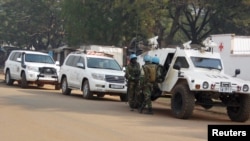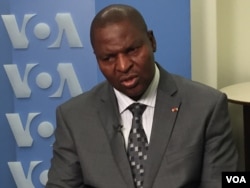Sporadic clashes between rebel groups in several villages in the Central African Republic are threatening the nation’s fragile peace process.
Three weeks ago, about 30 people were killed in fighting in Kouango, about 160 kilometers east of the capital, Bangui, on the Ubangi River, regional MINUSCA spokesperson Vladimir Monteiro told VOA.
Two more people were killed in Kaga-Bandoro and four in Domete in clashes between ex-Seleka rebels, a group that rose to power in 2013, and the anti-balaka, a vigilante group that opposes the Seleka. Ex-Seleka rebels attacked in retaliation for the killing of a young Muslim man, according to local news reports.
Radio France Internationale reported that 3,500 people were displaced by the fighting in Kouango. However, Monteiro said, peacekeeping forces have been able to maintain a strong presence in affected areas to send a message to the armed groups that they will not be able to disrupt stability.
Peacekeepers preventing violence
The United Nations Multidimensional Integrated Stabilization Mission in the Central African Republic has deployed its Pakistani contingent in Kaga-Bandoro to prevent violence from spreading. The mission also has deployed peacekeepers from Burundi and Gabon, who were based in the capital to reinforce their presence in Kaga-Bandoro and Domete, north of the capital.
In Koui, located in the northwest, Cameroonian peacekeepers have been deployed and the situation is under control, Monteiro said, but five people have died in the clashes.
Speaking to VOA’s French to Africa service, C.A.R. President Faustin-Archange Touadera said his nation’s military could play a greater stabilizing role if the arms embargo imposed on his country were lifted.
“We are putting in place democratic institutions, and we cannot have an army without weapons,” he said.
In 2013, the United Nations Security Council placed a ban on weapon supplies entering the country. Since then, the embargo has been extended until January 31, 2017.
In addition, the government has launched a Disarmament, Demobilization and Reintegration Program (DDR), a post-conflict process to ensure a peaceful transition and give former combatants incentives to lay down arms and learn job skills. All armed groups should take advantage of this important process, Monteiro said.
“We are trying to mobilize resources,” he added. “We are trying to sensitize all groups to participate in this DDR process.”
Dialogue as a way forward
The U.N. mission in the country says that security efforts must go hand in hand with dialogue for the country to move forward.
On November 17, C.A.R. governmental leaders are scheduled to meet with international partners at a donors conference in Brussels to discuss priorities in order to stabilize the country in the next three to five years.
“We want to break this cycle of crises every 10 years to lay a solid foundation in Central African Republic,” Touadera told VOA. He said the conference with the European Union will focus on sustainable development in the country.
Monteiro said the conference signals a new chapter of reconciliation for the country and it can’t afford to risk any backsliding.
“These incidents are taking place at a moment where the country is preparing for an important meeting in Brussels with its partners. We can not allow these groups to jeopardize all the work that is being done,” he said.





